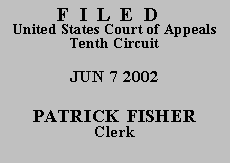 UNITED STATES COURT OF APPEALS
UNITED STATES COURT OF APPEALS
 UNITED STATES COURT OF APPEALS
UNITED STATES COURT OF APPEALS
TENTH CIRCUIT
This is a pro se § 2254 prisoner appeal. Mr. Martha was convicted of
sexual assault on a child and was initially sentenced to probation. Probation was
revoked and he was sentenced to seven years of imprisonment and five years of
mandatory parole.
In his federal habeas petition, Mr. Martha claims his constitutional rights
were violated because he was not indicted by a grand jury as provided by the
Fifth Amendment. The district court denied the § 2254 motion on the merits.
The district court noted that the Fifth Amendment right to charging by grand jury
is not applicable in state actions and that in Colorado a criminal action can arise
from information, complaint, or grand jury indictment. The district court also
denied Mr. Martha's motion for reconsideration and his request for a certificate
of appealability. Petitioner then applied to this court for a certificate of
appealability.(2)
LUIS HUMBERTO TARANGO
MARTHA,
Petitioner-Appellant,
v.
HOYT BRILL and ATTORNEY
GENERAL OF THE STATE OF
COLORADO,
Respondents-Appellees.
Before KELLY, McKAY, and
MURPHY, Circuit Judges.
After examining the briefs and the appellate record, this panel has
determined unanimously that oral argument would not materially assist the
determination of this appeal. See Fed. R. App. P. 34(a)(2); 10th Cir. R. 34.1(G).
The case is therefore ordered submitted without oral argument.
In order for this court to grant a certificate of appealability, Petitioner must make "a substantial showing of the denial of a constitutional right." 28 U.S.C. § 2253(c)(2). To do so, Petitioner must demonstrate that "reasonable jurists could debate whether (or, for that matter, agree that) the petition should have been resolved in a different manner or that the issues presented were adequate to deserve encouragement to proceed further." Slack v. McDaniel, 529 U.S. 473, 484 (2000) (quotations omitted).
We have carefully reviewed Mr. Martha's brief, the district court's disposition, and the record on appeal. Nothing in the facts, the record on appeal, or Appellant's brief raises an issue which meets the standards for the grant of a certificate of appealability. For substantially the same reasons as set forth by the district court in its Order of October 16, 2001, we cannot say that "reasonable jurists could debate whether (or, for that matter, agree that) the petition should
have been resolved in a different manner." Id. We DENY
Petitioner's request
for a certificate of appealability and DISMISS the appeal.
Appellant's motion to proceed in forma pauperis on appeal is
GRANTED.
Entered for the Court
Monroe G. McKay
Circuit Judge
*. This order and judgment is not binding
precedent, except under the
doctrines of law of the case, res judicata, and collateral estoppel. The court
generally disfavors the citation of orders and judgments; nevertheless, an order
and judgment may be cited under the terms and conditions of 10th Cir. R. 36.3.
2. At first glance, it appears that the notice of
appeal was untimely filed.
However, we hold that this appeal is timely because no separate judgment as
required by Fed. R. Civ. P. 58 has been entered. Rule 58 provides that "[e]very
judgment shall be set forth on a separate document. A judgment is effective only
when so set forth and when entered as provided in Rule 79(a)." The time to
appeal begins to run upon entry of the separate judgment. We have recognized
an exception to Rule 58's separate judgment requirement when there is no
question about the finality of the court's decision and when the order contains no
discussion of the court's reasoning or any dispositive legal analysis. See Clough
v. Rush, 959 F.2d 182, 185 (10th Cir. 1992). However, where an order does
contain such analysis, a separate document is necessary to start the time to
appeal. Id. Because the district court's order contains legal analysis, it does not
satisfy the requirement for a Rule 58 judgment or its exception.
Even though there is no separate judgment as required by Rule 58, we
accept jurisdiction in this case because "efficiency and judicial economy would
not be served by requiring the parties to return to the district court to obtain a
separate judgment." Id. at 185-86 ("If, by error, a separate judgment is not filed
before a party appeals, nothing but delay would flow from requiring the court of
appeals to dismiss the appeal."); see also Thompson v. Gibson, F.3d
, 2002
WL 982583, *1 (10th Cir. 2002) ("Rule 58 should be interpreted to preserve an
appeal where possible").
Click footnote number to return to corresponding location in the text.
![]() | Keyword |
Case |
Docket |
Date: Filed /
Added |
| Keyword |
Case |
Docket |
Date: Filed /
Added |
![]() (15614 bytes)
(15614 bytes)
![]() (10255 bytes)
(10255 bytes)
Comments to: WebMaster,
ca10 [at] washburnlaw.edu.
Updated: June 10, 2002.
HTML markup © 2002, Washburn University School of Law.
URL: http://ca10.washburnlaw.edu/cases/2002/06/01-1579.htm.